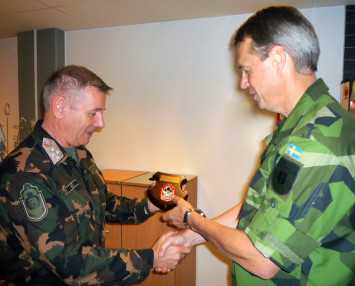Chief of Defence Visits Sweden
Szöveg: MoD Defence Staff | 2012. szeptember 14. 12:27Gen. Dr. Tibor Benkő, the Chief of the Defence Staff recently paid an official visit to Sweden. The aim of the two-day visit starting on September 11 was that the Swedish hosts allow their Hungarian partner an insight into the implementation of the training program at the FLSC (Flygvapnets Luftstrids Simulerings Center), the Swedish Air Force Air Combat Simulation Center on an exercise.
Hungary considers Sweden a principal partner, as it uses Swedish-made Gripen fighters to conduct air policing in the Hungarian airspace. In connection with this, there are good reasons for discussing the military professional issues in need of coordination, including those related to the training systems and the areas of their use.

The modification of the Gripen lease contract – which provides new opportunities as compared with the earlier version – was carried out on the initiative of the government of Hungary. Concluded in January 2012, the modified lease contract, which extends the leasing period to 2026 (by another ten years), provides significant stability and predictability in planning and implementing the training programs for pilots and aviation unit maintenance (AVUM) crews in the future.
The logistic support given for the full extension of the “term period" – together with the adding of the pilots’ and AVUM crews’ training needs to the terms of the contract – ensure the expected operational capability level of the Gripen squadron and its effective task execution. Accelerating the training of the flight personnel waiting for type conversion training and making this training schedulable brings significant advantages in improving the organizational strength of the tactical air squadron and in manning the quick reaction alert (QRA) service, which is a commitment of the Hungarian Defence Forces in NATO.
At the same time, the modification of the agreement significantly reduces training-related costs while it covers a large part of the related costs of the live fire exercises to be conducted, and so makes them schedulable because these form a part of the basic agreement.
Furthermore, in connection with the air simulator training, the agreement provides the pilots, intercept controllers (ICs) and joint terminal attack controllers (JTACs) with an opportunity to practice the special flying missions every year, which also saves further substantial costs for the Hungarian Defence Forces.